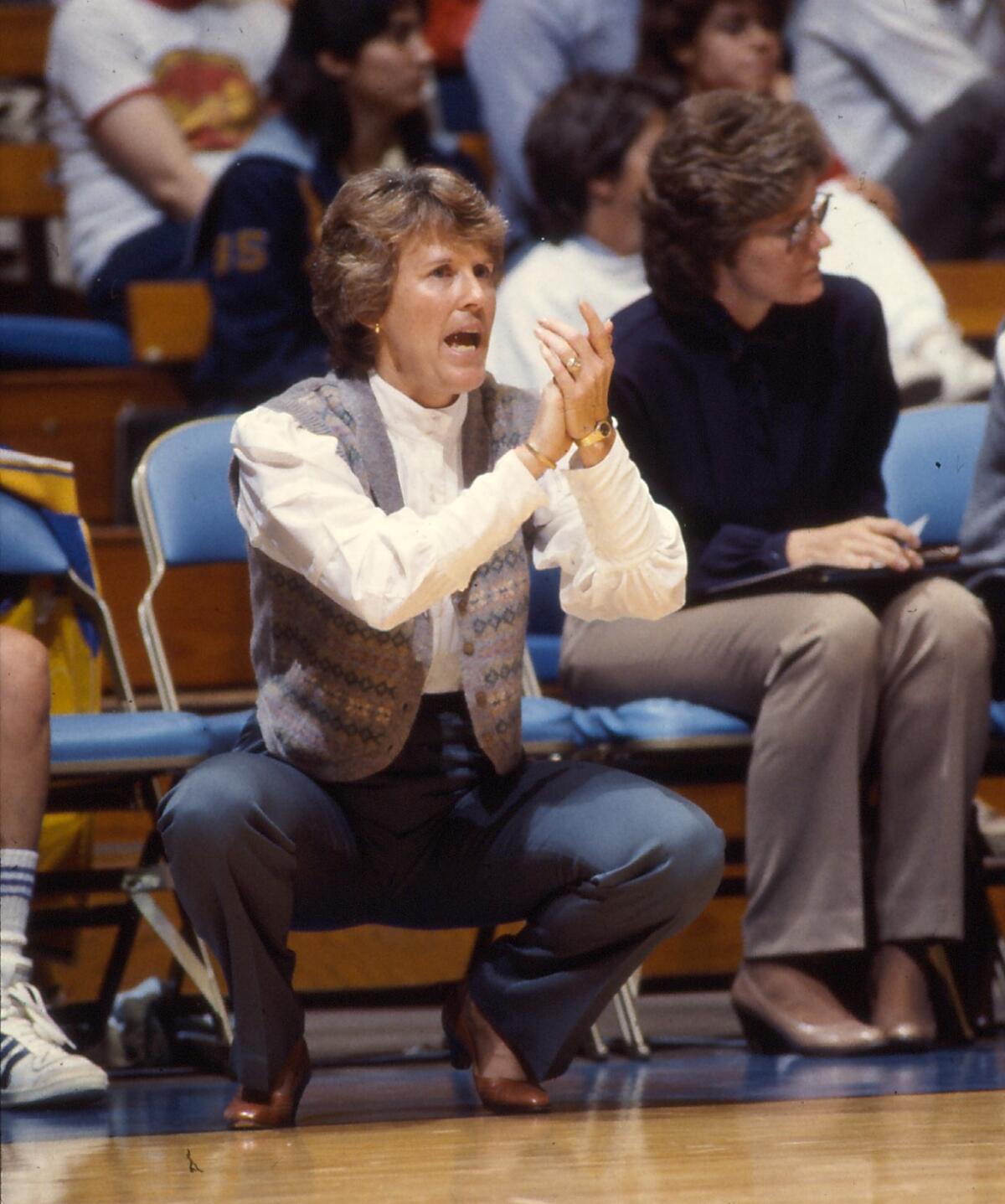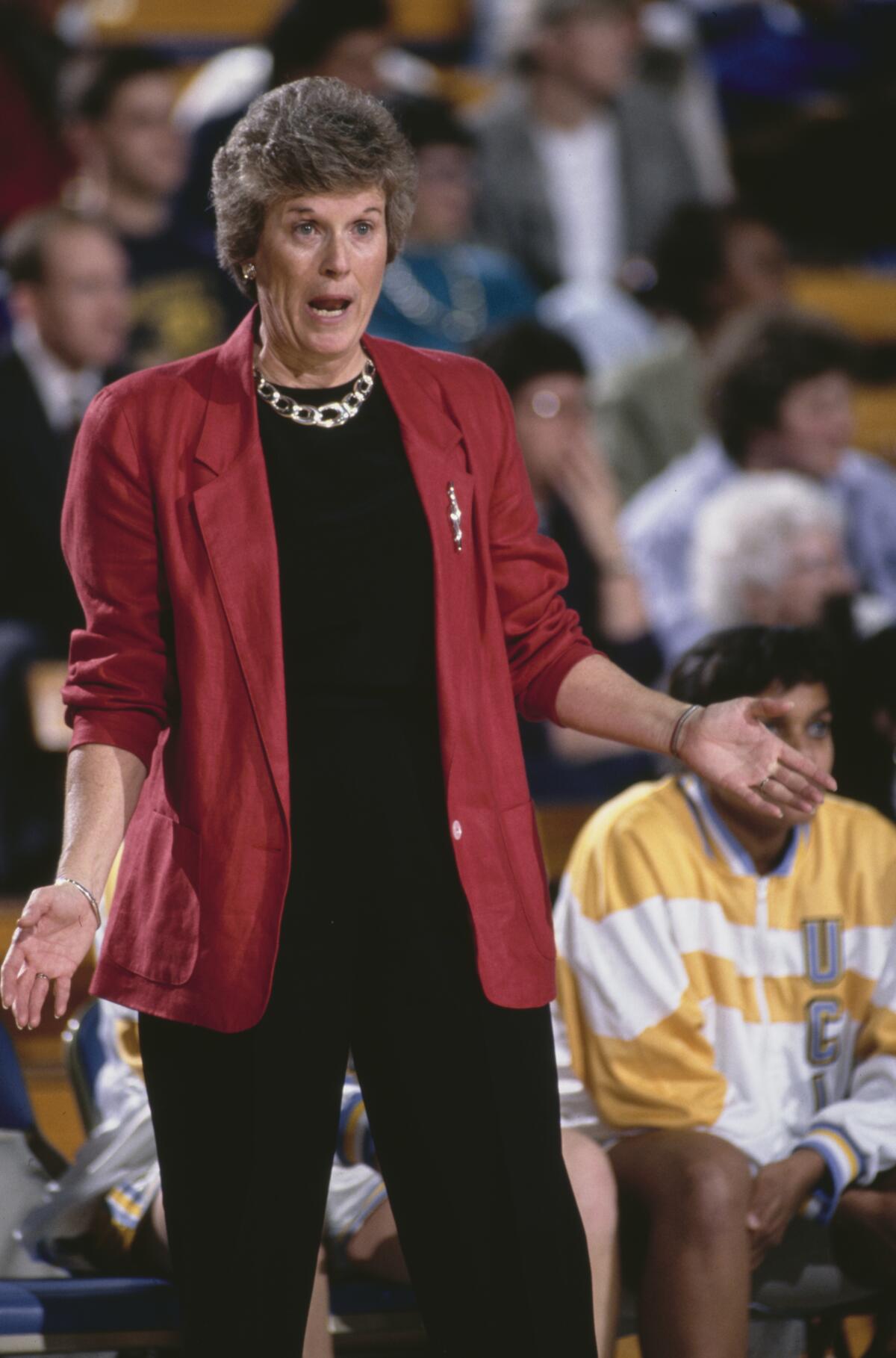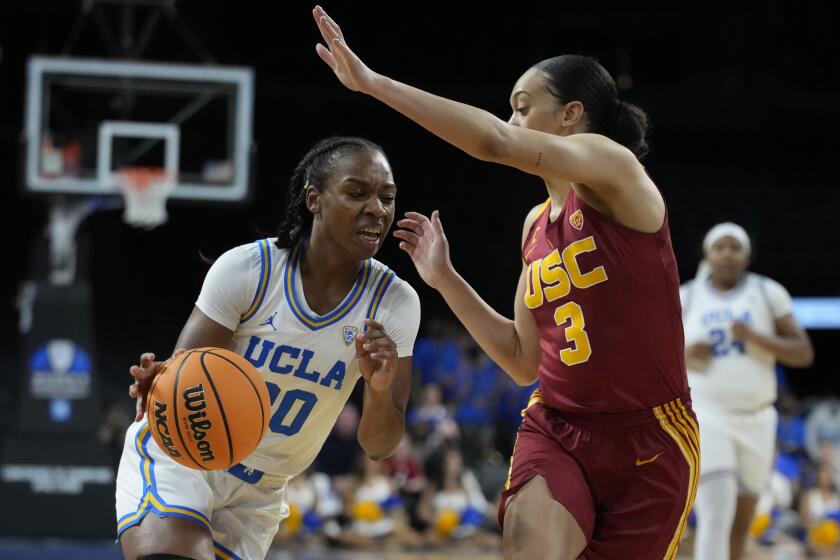Billie Moore, Olympic and UCLA basketball coach who won championships, dies at 79

- Share via
Ann Meyers Drysdale never let up while playing for the first U.S. women’s Olympic basketball team, even in practice. That meant she would occasionally have some explaining to do.
Her roommate, Juliene Simpson, wanted to know why she had done this or that, such as when Meyers Drysdale once unnecessarily slammed into her on a pick and roll.
It was because of their coach.
“You wanted to impress Billie, you wanted to please Billie, to know that you were playing hard for her, you were playing hard for the team,” Meyers Drysdale remembered.
Billie Moore always demanded full effort. It was why she made her players run, run again and then run some more in preparation for the powerful Soviet Union in those 1976 Olympics in Montreal, a bunch of college kids taking on a juggernaut with players in their mid-20s and 30s.
The game went as expected, Moore displaying a wry sense of humor in an aside to assistant coach Sue Gunter.
“I think the score was 20-0 and Billie, on the bench, looked at Sue and said, ‘Are we ever going to score?’ ” Meyers Drysdale said. “And we did, but I think we got blown out by 40 or something like that.”
The Americans went on to win the silver medal, serving as trailblazers for national teams that have now won seven consecutive golds without an Olympic loss since 1992. Moore amassed her own impressive haul, becoming the first women’s basketball coach to guide two college teams to national championships. She won it all with Cal State Fullerton in 1970 and again with UCLA in 1978 as part of a 24-year career in which she compiled a 436-196 record.
Surrounded in her final days at her Fullerton home by many of the players and coaches she inspired, memories shared as the mentor’s eyes brightened and she rattled off one-liners, Moore died Wednesday night from multiple myeloma. She was 79.

The list of those in the women’s game whom Moore touched reads like its own hall of fame, including legendary coaches Pat Summitt, Nell Fortner and Mickie DeMoss, among many others. The late Summitt, who played for Moore on the ’76 Olympic team before coaching Tennessee to eight national championships, once said Moore had been the most influential figure in her career.
“Billie is our John Wooden,” said Meyers Drysdale, a senior on the Bruins team that won the national championship as part of her own Hall of Fame career. “She truly has been a gift to us in the women’s game.”
Similarities between the universally revered UCLA coaches went beyond national titles. Both could let their players know they were upset without cursing, a look in their eyes saying everything.
Moore was also a master tactician. While Dianne Frierson was UCLA’s primary point guard during the national championship season, Moore realized there were times when it would be better to let Meyers Drysdale handle the ball so that Frierson could roam the wing to hit jump shots.
Even without a player taller than 6 feet 1, the Bruins routinely outrebounded opponents, thanks in part to a practice drill. A bubbled plastic cap would be placed over the rim, leading to random bounces on every shot. The player who wanted the rebound the most often got it.
Among her many standouts while coaching at UCLA was Jackie Joyner-Kersee, who played basketball before going on to Olympic glory in the heptathlon and the long jump.
“I will forever be grateful and thankful for her friendship beyond the basketball court,” Joyner-Kersee said. “Billie gave me an opportunity to pursue my dream of becoming a Bruin.”
Meyers Drysdale had known Moore long before Moore replaced Ellen Mosher as the Bruins’ coach before the 1977-78 season. The first impression didn’t hold up. Meyers Drysdale’s older sister, Patty, had been the starting center on Moore’s championship team at Cal State Fullerton after Moore replaced a beloved predecessor for her first head coaching job at age 26.
“She didn’t like Billie, so I didn’t like Billie,” Meyers Drysdale said with a laugh.
Meyers Drysdale was among the scores of former players who remained close with Moore long after their careers ended. Coaches from many other sports also sought her out for advice, given her ability to simplify teaching concepts.
No. 10 UCLA women’s basketball proved themselves with a tough nonconference schedule, but face a major test when they face rival USC to open Pac-12 play.
Born on May 5, 1943, in Westmoreland, Kan., Moore’s early influences included her father, a high school principal and coach of the boys’ and girls’ basketball teams whom she credited for her passion for the game.
After getting her start in coaching as an assistant at Southern Illinois, Moore spent eight seasons at Cal State Fullerton, compiling a 140-15 record, before taking the UCLA job. She went 296-181 in 16 seasons with the Bruins before retiring in 1993 to work as a consultant and camp instructor.
“She set high standards for herself and those who played and worked with her and never took shortcuts or allowed those around her to settle for anything less than their best,” said Pam Walker, who spent four seasons on Moore’s UCLA staff and is now the Bruins’ director of operations. “She was uncompromising in her integrity — that’s how she coached and also how she lived.”
Moore was inducted into the Naismith Memorial Hall of Fame and the Women’s Basketball Hall of Fame. At her Naismith induction ceremony in 1999, Moore said coaches only thrive because of others, thanking Meyers Drysdale and fellow UCLA star Denise Curry as they stood behind her on the stage.
“Someone asked me how I got into the Hall of Fame,” Moore said before casting a backward glance to her players, “and I said I think these two ladies standing right here had a lot to do with bringing me into the Hall of Fame.”
More to Read
Go beyond the scoreboard
Get the latest on L.A.'s teams in the daily Sports Report newsletter.
You may occasionally receive promotional content from the Los Angeles Times.








